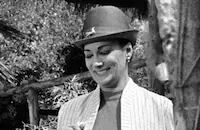The Car
Brief Synopsis
Cast & Crew
Elliot Silverstein
Eddie Little
James Brolin
John Marley
Margaret Willey
John Rubinstein
Film Details
Technical Specs
Synopsis
A small town is terrorized by a fast black indestructible car, which is killing people by running them over, or ramming their cars off the road. It's up to Sheriff Wade to catch it before the driver before kills again. The only problem is, there's no one behind the wheel.
Director
Elliot Silverstein
Cast
Eddie Little

James Brolin

John Marley
Margaret Willey
John Rubinstein
Elizabeth Thompson
Kyle Richards
Ronny Cox
Geraldine Kearns
Melody Thomas Scott
Kim Richards
Bob Woodlock
Kate Murtagh
Lee Mclaughlin
Kathleen Lloyd
Tony Brande
Roy Jenson
Don Keefer
James Rawley
Steve Gravers
Robert Phillips
John Moio
Hank Hamilton
Henry O'brien
Ernie Orsatti

Doris Dowling
Louis Welch
Read Morgan
Bryan O'byrne
R. G. Armstrong
Crew
William R Aldridge
James Alexander
A J Bakunas
George Barris
Marvin Birdt
Michael Butler
Michael Butler
Kevin F Cleary
Everett Creach
Gary Daigler
Jack Faggard
Paul Hickerson
Gerald Hirschfeld
Ed Kennedy
John Mccarthy Jr.
Michael Mccroskey
Eddie Mulder
Lloyd S. Papez
George Phillips
Todd Ramsay
Leonard Rosenman
Peter F Saphier
Rick Sharp
Dennis Shryack
Dennis Shryack
Elliot Silverstein
Lane Slate
John Stacy
Rock Walker
Film Details
Technical Specs
Articles
Doris Dowling (1923-2004)
Doris Dowling was born on May 15, 1923 in Detroit, Michigan. She showed an interest in acting at a young age, and after a few years of stage work in the Midwest, she joined her older sister, the leading lady Constance Dowling, in Hollywood. Paramount soon took notice of the sultry brunette with the soulful expression and husky voice, and promptly signed her to a contract.
She made a stunning film debut as Gloria, the hooker who befriends Ray Milland at a bar, becoming his good-humored confidante in The Lost Weekend (1945); she followed that up in the overlooked, film noir gem, The Blue Dahlia (1946), playing Alan Ladd's shrewish wife before being killed by a mystery killer in the first reel. She made another noir thriller, the forgettable, The Crimson Key (1947), playing, once again, an unsympathetic part before heading off to Europe. Once there, Italian director Giuseppe de Santis used her effectively in Bitter Rice (1948), arguably her best performance as the jewelry thief hiding among women rice workers in Northern Italy; another notable role was as Bianca in Orson Welles' French production of Othello (1951).
She returned to Hollywood in the late '50s, and spent the next three decades doing television work: Bonanza, Perry Mason, Alfred Hitchcock Presents, Barnaby Jones, and The Streets of San Francisco, just to name a few. She retired quietly from acting by the early '80s. She was briefly married to bandleader Artie Shaw (1952-56), and is survived by her son through that marriage, Jonathan; and her husband of 44 years, Leonard Kaufman.
by Michael T. Toole

Doris Dowling (1923-2004)
Quotes
Trivia
There were six Cars built for filming by Barris Kustoms in Lynnwood, California: one main car of steel and five fiberglass replicas. Three replicas were destroyed in the climactic explosion scene and the other two replicas were wrecked in rollovers. The gloss-black main Car is a custom Lincoln Mark III with a locked 4.11 differential (to allow easier spinning), heavy-duty suspension, roll bar, safety harness, and amber-tinted glass. The top is lowered and the beltline raised. Twelve craftsmen built the main Car in six weeks.
Miscellaneous Notes
Released in United States 1977
Released in United States 1977













